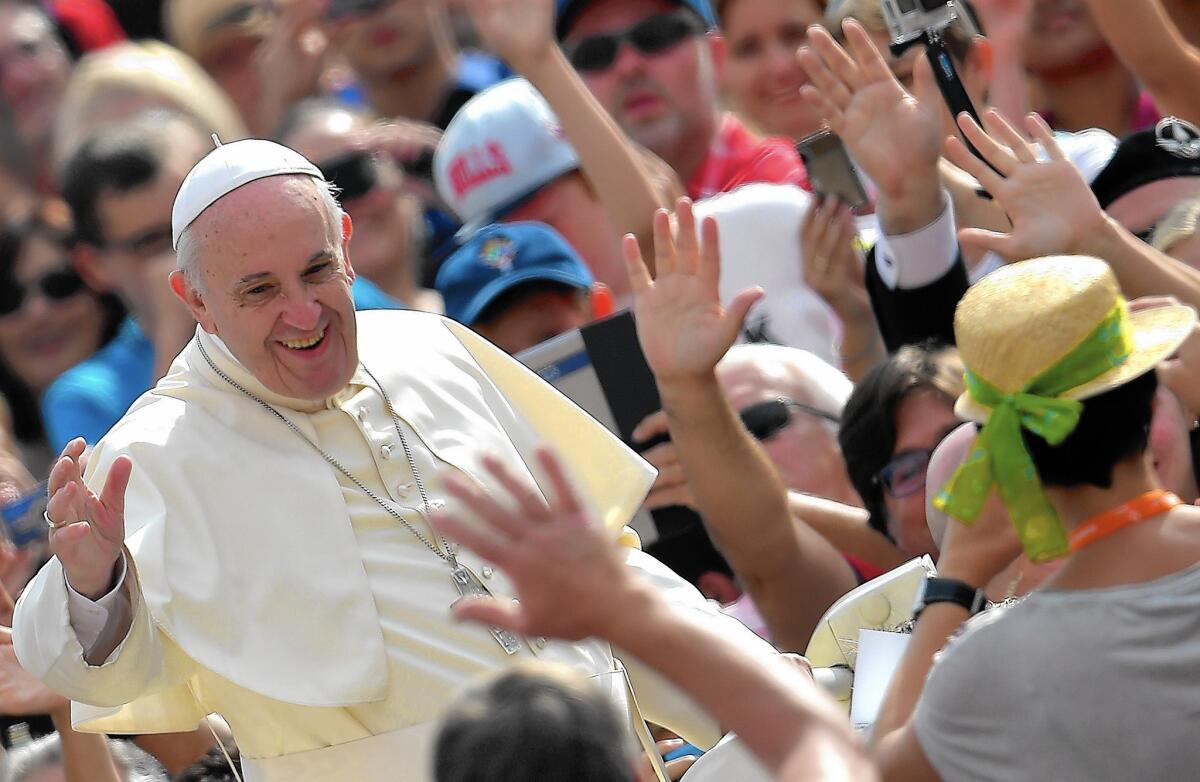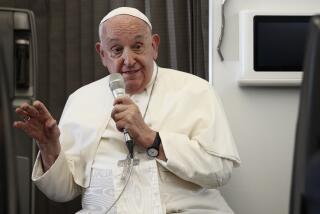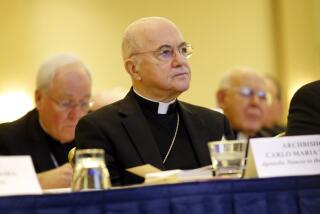Pope Francis, whose vision has captivated the world, brings it to North America

reporting from VATICAN CITY — There was a flash of white, then the flash of numerous cameras held aloft by startled onlookers.
Before them on a bustling street in Rome was Pope Francis, who had popped out of the Vatican to run a quick errand. Clad in his usual white cassock and accompanied by his security detail, the pope swept into the optician’s to have new lenses fit into his old eyeglass frames.
People quickly gathered outside and gaped as the pontiff tried on the glasses, seemed pleased with the result and insisted on paying for his purchase. He emerged a short while later, hopping back into his Ford Focus and smiling and waving at the delighted crowd.
It was a mundane outing earlier this month, but also an apt metaphor for what has been a remarkable papacy so far. Since he was elected by his fellow cardinals in 2013 to head the Roman Catholic Church, Francis has captivated the public imagination the world over with his down-to-earth demeanor even as he tries to fit a new vision onto the ancient institution he leads.
He’s bringing that vision to North America with a visit to Cuba beginning Saturday and to the United States on Sept. 22-27. The trip embraces the lofty — with addresses to Congress and the United Nations — as well as the lowly — meetings with homeless people and migrant families. It will be the first time that the 78-year-old pontiff has set foot in the U.S.
His very lack of flamboyance has, paradoxically, turned him into a spiritual rock star and newsmaker who has graced the covers of Rolling Stone, Time and National Geographic. Rapturous crowds greet Francis worldwide; a million or more people are expected to attend his outdoor Mass in Philadelphia on Sept. 26.
At his other U.S. stops, Washington and New York, he’ll carry a message of warning, Vatican watchers say: of the threats posed by climate change, of the evils of unfettered capitalism and materialism.
History’s first Latin American pope also will speak of mercy, of the need to extend God’s compassion to the poor and oppressed through a church that tends to people’s wounds like a “field hospital,” as he described it in one of his most striking images.
Previous pontiffs, including his two most recent predecessors, John Paul II and Benedict XVI, sounded similar themes. Yet Francis has fired up an energy and enthusiasm not seen in the scandal-fatigued church in years with his homespun style, his humor and bonhomie.
His appeal extends to non-Catholics, non-Christians and even nonbelievers who admire his emphasis on reconciliation, love and environmental protection. His ability to strike a nerve with such a diverse audience makes him not unlike the man whose emissary he’s supposed to be, supporters say.
“If you think about Jesus … he was very popular, because his message attracted many people, including people who were very far from religion at the time,” says Antonio Spadaro, who edits the Jesuit journal La Civilta Cattolica in Rome. “The message that Francis is spreading, which is the Gospel, is reaching people who have never been interested in that.
“He is the right man at the right time.”
But Jesus wasn’t the CEO of a multibillion-dollar organization dogged by accusations of arrogance, corruption and the criminal abuse of children and adults. Or the boss of a dysfunctional institution with layers of management, including powerful underlings and ordinary followers who disagree with or actively oppose his agenda.
Some of those dissenters can be found in the U.S., home to 72 million Catholics, not all of whom appreciate Francis’ approach to those two perennially hot-button topics: sex and money.
Conservative bishops in the U.S. and elsewhere grumbled when Francis appeared to take a softer line on the vexed issues of abortion, homosexuality and divorce and remarriage. Officially, the church frowns on all of those.
Statements such as “Who am I to judge?” regarding gays, which instantly went viral, or his warning to clergy not to obsess over contentious social issues like abortion alarmed Francis’ critics.
But many commentators note that the pope has given no indication of intending, or even wanting, to change church doctrine. In fact, he’s consistently upheld it, disappointing some liberal reformers.
“In style and gestures, Francis is surprising and sometimes shocking, but this doesn’t have to do with the core teachings of the church,” says Robert Gahl, an American priest who teaches at the Pontifical University of the Holy Cross in Rome. “He has said he will not change those.”
What’s indisputable is the shift in tone.
The teachings may be immutable, but for Francis, how they’re applied and preached needs to change — from judgment to mercy, from rigidity to a sympathetic understanding that life is messy.
This month, he announced that, during a special holy year starting in December, all priests, not just senior clergy, would be allowed to absolve repentant women who have had abortions. He underscored the “tragedy of abortion,” but acknowledged that it was an “agonizing and painful decision.”
He has exhorted priests and bishops to be more caring pastors, to draw closer to their flocks so that they become “shepherds with the smell of sheep.”
Such folksy pronouncements have endeared the pope to many Catholics. Experts talk of the “Francis effect,” the anecdotal evidence of disaffected or indifferent Catholics renewing their interest in the faith because of the pope.
Even among Americans with no religious affiliation, a recent survey by the Public Religion Research Institute found that 60% held a positive view of Francis, an attitude that’s trickled down to benefit some of those who serve below him.
“I can be in the street or a supermarket or an airport, and I can tell that the way [people] see me is different because of what they think of Pope Francis,” says Gahl, who normally wears his clerical collar. “It used to be that people who were distant to church practice would see me as a threat; they were probably thinking of [priestly] sexual abuse or condemnation of their way of life. But it’s really shifted.”
Besides comforting the afflicted, Francis happily afflicts the comforted.
On his visit to the U.S., the pope probably won’t stint on his criticism of heedless consumerism and exploitation of natural resources. “A Christian who is too attached to riches has lost his way,” Francis recently admonished the 7 million followers of his official English-language Twitter account, @Pontifex. He has called on the Catholic Church to be a “poor church for the poor.”
Rush Limbaugh has denounced the pope as a Marxist. Others dismiss Francis, who picked his papal name partly in homage to the nature-loving St. Francis of Assisi, as a tree-hugger. More liberals than conservatives look favorably on him, though still a majority of both, according to the Public Religion Research Institute poll.
Matthew Bunson, editor of the Catholic Almanac, says the pope’s views are rooted in “his own lived experiences of capitalism and globalization” in his native Latin America, where poverty is common. So is suspicion of U.S. political and economic might.
In his Sept. 24 address to a joint session of Congress, the first ever by a pontiff, “he’s going to call upon the United States to ... work for the common good globally,” Bunson says.
“Times Square, Wall Street — that kind of face of America I don’t think he will like. But I think the pope knows that the world still depends on the U.S.A.,” says Antonio Sabetta, a professor at Pontifical Lateran University in Rome. “It could be a good opportunity to make the world more aware of important problems: poverty, immigration. And to have the support of the president of the United States on those kind of topics could be very good for him.”
Francis has major problems to tackle in his own backyard: among them, an unwieldy Vatican bureaucracy beset by infighting and ongoing complaints of cover-ups by bishops and other senior officials of sexual abuse by priests.
But Sabetta believes the pope is committed to overhauling the Vatican and the church as a whole, or at least planting the right seeds that others can continue growing when his papacy ends. Francis made a splash from virtually the moment he was unveiled as the new pope the night of March 13, 2013, but Sabetta says it’s too soon to judge his achievements, or lack of them.
“You cannot make big changes in two years. Two years in the Catholic Church is almost nothing,” Sabetta says. “One billion people belong to the Catholic Church. We still need time to see if he accomplishes the many things he said he would.”
Twitter: @HenryHChu
More to Read
Sign up for Essential California
The most important California stories and recommendations in your inbox every morning.
You may occasionally receive promotional content from the Los Angeles Times.











